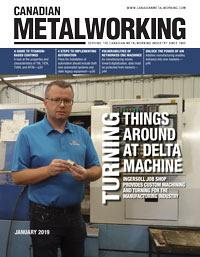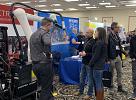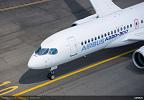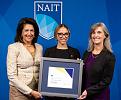Associate Editor
- FMA
- The Fabricator
- FABTECH
- Canadian Metalworking
Ingersoll job shop’s custom machining serves local manufacturing industry
Delta Machine and Design provides custom machining, turning, and tool work
- By Lindsay Luminoso
- January 22, 2019
- Article
- Metalworking
Delta Machine and Design Ltd. has been machining custom parts in the Ingersoll, Ont., area since 1986. However, two years ago the company changed hands. Founder Dave Swatridge wanted to retire, so cousins Brad and Kevin Stubbe bought the company and took over with the hope of growing the business both in size and capabilities.
Kevin Stubbe started out as a mechanical designer and moved into project management at Bell-Camp Manufacturing, Ingersoll, Ont., a fabricating and welding shop that his cousin Brad owned. Delta had always been a good supplier and partner with Bell-Camp, so when the business came up for sale, both Brad and Kevin jumped at the chance to lead the company.
Delta Machine is located in an industrial area of Ingersoll with three buildings on-site; currently only two of the buildings are being used. Stubbe sees this third building as an opportunity for future expansion. For now, the 21,000-sq.-ft. machine shop allows the company to effectively specialize in custom machining and tool work, as well as production machining.
Delta continues to partner with Bell-Camp, where Brad remains president. So the duo sells themselves as a total solutions provider because they can focus on their specialty while still offering additional capabilities.
"We have approximately 25 workers in our machine shop, half of whom are certified machinists and the other half machine operators," said Stubbe. "We really focus on custom machining and manufacturing of bronze bushings, plastic grinding wheel bushings, custom bolts, and moulded urethane parts."
JOB SHOP
Stubbe noted that the work they receive is totally custom, but they are willing to take on any project that comes in the door as long as they have the available machine capacity. Currently Delta can work with steel, aluminum, stainless, plastic, and bronze and focuses on servicing the manufacturing plants in the region, including CAMI, Martinrea, and Butcher Engineering.
"We do a lot of service work for [the manufacturing industry]," said Stubbe. "For example, we design assembly-assist tooling for Butcher Engineering. We also have numerous other large manufacturing facilities in the Kitchener to London area that we work with. We get customers that come in looking for a tool to help assemble this to that and need us to come up with a tool design. So we start with the concept, work through a prototype, and then get into the production tools."
Interestingly, Delta works with an automotive customer in Toronto that gets a lot of its parts from China, and quite often they are incorrect. So rather than send the parts back to China, the auto company sends them to Delta to be reworked. For example, all the ball joints on a certain product were out of tolerance, so Delta pressed the old joint out, put a new one in, reassembled them, and repackaged the parts to be sent back to the customer.
"Sometimes it can be thousands of parts at a time, but we are up for the challenge," said Stubbe.
SWEET SPOT
One of Delta’s sweet spots is that it builds and stocks parts for OEMs like Hyd-Mech. The shop has been machining and stocking Hyd-Mech saw components for more than 15 years, allowing the OEM to draw from the stock whenever needed.

The 21,000-sq.-ft. shop is located in Ingersoll, Ont., features three buildings, only two of which are currently being used.
Hyd-Mech isn’t the only OEM that Delta works with; the company also sources, cuts, and machines many components for a forestry equipment manufacturer. In many cases, the machined components get kitted up and sent back to the customer, where they are used to assemble their machines.
"There’s quite a bit of competition in this region," said Stubbe. "Everybody seems to have a niche, and I would say our advantage is in customer service and our ability to multitask. We also offer design work, which a lot of other machine shops don’t. I’m a mechanical engineer, and we also have tool and diemakers on staff."
SHOP FLOOR
The shop floor is evenly split between milling machines and lathes. Most of Delta’s milling machines are semi-automated and are predominantly from the TRAK® line.
Stubbe noted that they have 15 lathes or turning centres with a maximum capacity of 26 in. diameter and 10 ft. long. The machine shop has several general machining lathes including TRAK, Dean Smith & Grace, Harrison, and TOS. The shop’s turning centres for production machining include Hyundai, KIA, Yang, and Doosan CNC lathes.
"We handle a large variety of turning projects, each unique and with different requirements," said Stubbe. "One thing that we’ve learned is that it is critical to work with tooling suppliers to source the best kind of tooling for each application."When projects come in, Delta assesses the tolerances, turnaround times, and materials required for the parts to be turned. According to Delta, its ability to take on a large variety of turning projects gives it a competitive edge in the London area.
"When it comes to turning, it’s also good to surround yourself with a good team of employees," Stubbe added.
CHALLENGES
At any given time, the company has upwards of 100 projects on the go at varying stages and sizes.
However, over the past year, the company was plagued with the uncertainty of NAFTA. It was able to adjust and deal with the increasing cost of steel and aluminum, which in some cases exceeded 30 per cent.
Lucky for Delta, a large number of its customers have had decade-long relationships with the company and recognize that this challenge is something job shops, machine shops, and the manufacturing industry as a whole face. The company has also urged the government to work with Canadian manufacturers to ensure competitiveness far into the future.
THE FUTURE
When Brad and Kevin took over the business, the focus was on growing. The most recent goal is to expand into the third building, which is currently unused, within the next two to five years.

The shop has 15 lathes and turning centres with a maximum capacity of 26 in. diameter and 10 ft. long.
Right now Delta is implementing an ERP system, which is something new and challenging for the team. Stubbe said that this is all part of an overall plan to perform and serve customers better. Plus, the ERP limits the time and amount of paperwork, whether from payroll or the shop floor. The system is helping the company to track projects better and forecast machine utilization.
The company currently has a good mix of junior-, intermediate-, and senior-level workers, although it has had the same challenges many other machines shops have: finding skilled workers. Stubbe said that it’s important to develop the younger generation and get them into machinist programs and help train them in real-world conditions. It is for this reason that Delta partners with Fanshawe College and Conestoga College to bring in co-op students.
"We’d like to continue to grow, be a total solution provider for our customers, and be a great place to work at for team members," Stubbe said.
Associate Editor Lindsay Luminoso can be reached at lluminoso@canadianmetalworking.com.
Delta Machine and Design, www.deltamachinecanada.com
About the Author

Lindsay Luminoso
1154 Warden Avenue
Toronto, M1R 0A1 Canada
Lindsay Luminoso, associate editor, contributes to both Canadian Metalworking and Canadian Fabricating & Welding. She worked as an associate editor/web editor, at Canadian Metalworking from 2014-2016 and was most recently an associate editor at Design Engineering.
Luminoso has a bachelor of arts from Carleton University, a bachelor of education from Ottawa University, and a graduate certificate in book, magazine, and digital publishing from Centennial College.
subscribe now


Keep up to date with the latest news, events, and technology for all things metal from our pair of monthly magazines written specifically for Canadian manufacturers!
Start Your Free Subscription- Industry Events
MME Saskatoon
- May 28, 2024
- Saskatoon, SK Canada
CME's Health & Safety Symposium for Manufacturers
- May 29, 2024
- Mississauga, ON Canada
DiPaolo Machine Tools Open House 2024
- June 4 - 5, 2024
- Mississauga, ON Canada
FABTECH Canada
- June 11 - 13, 2024
- Toronto, ON Canada
Zoller Open House & Technology Days 2024
- June 12 - 13, 2024
- Ann Arbor, MI






















